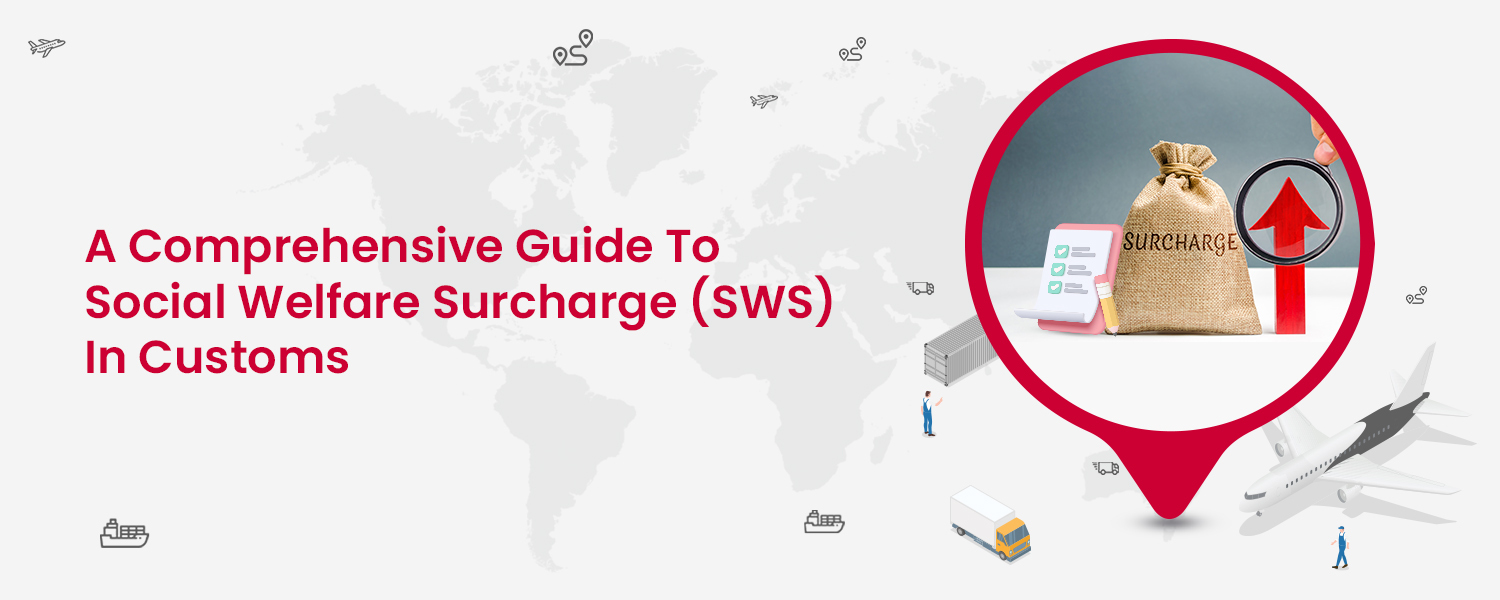As you continue to capitalise on the increasing demand for imported goods, there’s one charge that often causes confusion and can significantly impact your bottom line – the Social Welfare Surcharge (SWS).
At first glance, it might appear that SWS is just another duty to pay. But as with all things related to customs and taxes, the devil is in the details. Refrain from understanding SWS could lead to unexpected costs, disrupting your profit margins and leaving you with unwelcome surprises.
Therefore, for all eCommerce businesses, online sellers, and international traders, this guide is carefully curated to throw light on the aspect of social welfare surcharges and customs duties. Here, you’ll learn about SWS, how to calculate it, what the exclusions are, the role of CBIC in SWS, and much more.
What is Social Welfare Surcharge?
The Social Welfare Surcharge, introduced in the Finance Budget of 2018, is like a shadow that follows every imported item, adding an extra layer of cost to your customs duties. Established under Section 110 of the Finance Act 2018, this surcharge is designed to support the Government’s commitment to education, health, and social security.
Levied at 10% of the aggregate of duties, taxes, and cesses, it plays a crucial role in determining the total amount payable by importers. However, the SWS is not an ordinary surcharge. It holds a special place in the customs framework, and a deeper dive reveals a nuanced mechanism behind its calculation. Let’s understand how to calculate SWS.
Calculation of Social Welfare Surcharge
SWS is calculated at the rate of 10%. But here’s the crucial part – it’s not calculated on the value of the imported goods, as one might intuitively think. Instead, it’s calculated on the aggregate of all duties, taxes, and cesses that are levied and collected by the Central Government on imported goods.
This means that if you’re importing goods into India, you first need to calculate the total sum of all applicable duties, taxes, and cesses. That aggregate sum then becomes the base upon which the SWS is calculated. So, if your aggregate duties and taxes come to INR 100,000, your SWS would be INR 10,000 (10% of 100,000).
In an interesting turn of events, a circular issued by the Central Board of Indirect Taxes and Customs (CBIC) in February 2022 clarified this calculation significantly. They clarified that if the aggregate of customs duties on an import is zero, then the SWS, despite not being explicitly exempted, would be ‘Nil.’
This means if you’re importing goods that are exempted from basic customs duties, your SWS would be zero, even if SWS is not specifically exempted for those goods.
Exclusions from the Social Welfare Surcharge
Several types of customs duties do not contribute to the SWS calculation, and the reasons for their exclusions shed light on the nuanced nature of customs law.
Safeguard Duty and its Relation to SWS
The safeguard duty serves as a protective measure, levied to shield domestic industries from sudden surges in imported goods that could cause serious injury. This temporary charge is implemented as a response to unforeseen increases in imports, helping to balance market forces. However, safeguard duty doesn’t factor into the SWS calculation. The rationale for this is clear: safeguard duty is situational, transient, and contingent on market dynamics. Including it in the SWS calculation, which supports consistent, long-term societal objectives, would introduce unnecessary variability.
Countervailing Duty: An Exclusion from SWS
Countervailing duty is imposed to counter the negative impact of subsidies provided by foreign governments on their exports. This is necessary to ensure fair competition between domestic and foreign goods. Since the countervailing duty is a corrective measure designed to restore balance rather than generate revenue, it isn’t included in the SWS calculation. Its purpose is to level domestic goods’ playing field, not finance social welfare projects.
Anti-dumping Duty in SWS Calculation
Anti-dumping duty is applied when foreign manufacturers sell goods in India at a price below their domestic market or cost of production, a practice known as “dumping.” Like the countervailing duty, the anti-dumping duty is a protective measure intended to guard domestic industry against unfair trade practices, hence its exclusion from the SWS calculation.
SWS Levied Under Sub-section (1)
Interestingly, the SWS levied under sub-section (1) is also excluded from the SWS calculation. This might seem counterintuitive, but it prevents a recursive loop in the SWS calculation, which would result if the SWS were calculated on itself. By excluding this, the law ensures that the SWS is calculated cleanly based on a well-defined aggregate of duties, taxes, and cesses.
Impact of Customs Act, 1962 on Social Welfare Surcharge (SWS)
The Customs Act 1962 serves as the foundational structure that regulates the levies on imports and exports in India. The provisions of this act apply to the SWS insofar as they relate to the import and export duties. This broad applicability ensures that SWS is collected, refunded, and administered effectively and uniformly nationwide.
The implications of the Customs Act 1962 permeate various aspects of the SWS. Each of these aspects plays a crucial role in ensuring the effective implementation and collection of the surcharge.
Assessment and Levy: The Act provides a robust mechanism for the assessment and levy of customs duties, which also extends to the SWS. The SWS is calculated as 10% of the aggregate of customs duties, making the assessment process defined under the Customs Act crucial for accurately determining the amount of surcharge.
Non-Levy and Short-Levy: If, for any reason, there is a non-levy or short-levy of SWS, the Customs Act provisions allow for recovery mechanisms. These mechanisms ensure that the proper amount of surcharge is collected, contributing to the social welfare objectives of the surcharge.
Refunds and Exemptions: The provisions for refunds and exemptions under the Customs Act, 1962, also apply to the SWS. These mechanisms allow for the reimbursement of the surcharge in case of overpayment or exemption in specific cases, ensuring that importers are not unduly burdened.
Interest: Any delay in the payment of SWS could attract interest as stipulated under the provisions of the Customs Act, 1962.
Appeals: The Customs Act of 1962 provides a structure for appeals in case of disputes related to the levy of customs duties. This structure also applies to disputes regarding the SWS, ensuring fair and transparent resolution of disagreements.
Offences and Penalties: Any violations relating to the payment of SWS fall under the purview of offences outlined in the Customs Act, 1962, attracting penalties as per the Act.
Conclusion
SWS has revealed itself to be much more than just another customs charge. For eCommerce businesses, understanding SWS is not just about compliance; it’s about acknowledging their contribution towards the country’s social advancement, one import at a time.
We hope that the insights you gained from this comprehensive guide empower you to navigate the complexities of customs with renewed confidence and contribute to a socially secure future. Moreover, you must understand that in the import-export business, there are many things one should care about, like AD code, import-export code, etc., that will help you in fast customs clearance and smooth international trade.
FAQs
Is the social welfare surcharge refundable?
The social welfare surcharge is not refundable. According to a clarification provided by the Central Board of Indirect Taxes and Customs (CBIC), the social welfare surcharge on imported goods is to be paid in cash and cannot be refunded through duty credit scrips.
Can we claim a social welfare surcharge?
Yes, a social welfare surcharge can be claimed. The social welfare surcharge is levied on imported goods and is calculated at a rate of 10% of the customs duty collected.
Is social welfare surcharge charged on gold?
No, the Indian government has exempted gold imports from the payment of the Social Welfare Surcharge (SWS).
What is the full form of SWC in import?
Social Welfare Cess is the full form of SWC in import.
What is CVD in import duty?
Countervailing Duty (CVD) in import duty is a tax imposed on imported goods to counteract the advantage of lower-priced foreign goods and bring them to par with domestically produced goods. The duty rate is set equivalent to the excise levied on similar goods manufactured within the importing country, thereby neutralizing the price difference and protecting domestic industries.




